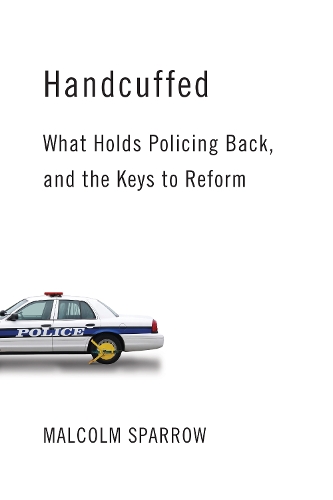
Handcuffed: What Holds Policing Back, and the Keys to Reform
(Hardback)
Publishing Details
Handcuffed: What Holds Policing Back, and the Keys to Reform
By (Author) Malcolm K. Sparrow
Bloomsbury Publishing PLC
Brookings Institution
26th April 2016
United States
Classifications
Professional and Scholarly
Non Fiction
Crime and criminology
363.20973
Physical Properties
Hardback
270
Width 146mm, Height 216mm, Spine 24mm
517g
Description
The current crisis in policing can be traced to failures of reform.
Sparrow surely is right to condemn policing directed only at crime rates rather than community satisfaction.
The New York Times Book Review
In the past two years, America has witnessed incendiary milestones in the poor relations between police and the African-American community: Ferguson, Baltimore, and more recently Baton Rouge, St. Paul, and Dallas.
Malcolm Sparrow, who teaches at Harvard Kennedy School of Government and is a former British police detective, argues that other factors in the development of police theory and practice over the last twenty-five years have also played a major role in contributing to these tragedies and to a great many other cases involving excessive police force and community alienation.
Sparrow shows how the core ideas of community and problem-solving policing have failed to thrive. In many police departments these foundational ideas have been reduced to mere rhetoric. The result is heavy reliance on narrow quantitative metrics, where police define how well they are doing by tallying up traffic stops, or arrests made for petty crimes.
Sparrow's analysis shows what it will take for police departments to escape their narrow focus and perverse metrics and turn back to making public safety and public cooperation their primary goals. Police, according to Sparrow, are in the risk-control business and need to grasp the fundamental nature of that challenge and develop a much more sophisticated understanding of its implications for mission, methods, measurement, partnerships, and analysis.
Reviews
We need a clear vision of where policing in America is headed. We surely need a broader view of what it means to succeed in the vital but enormously complex enterprise of policing. Sparrow provides rich and very timely help. Every police chief will find ideas here they can use, and their communities will be better served as a result.Charles Ramsey, Cochair, Presidents Task Force on 21st Century Policing, and Former Commissioner, Philadelphia Police Department
Hardly anyone writes more thoughtfully and perceptively about policing than Malcolm Sparrow. He argues here that American law enforcement has lost its way by failing to follow through on the core commitments of community and problem-oriented policing. Anyone who cares about the state of American policing should read this book.David Alan Sklansky, Stanley Morrison Professor of Law, Stanford Law School
Malcolm Sparrow, one of the nations leading scholars on policing, provides timely and penetrating analysis. He brushes aside, with refreshing candor, much of the contemporary superficial treatment of the fields ills, challenging claims and assumptions that clutter popular reform agendas. He proposes more profound and ambitious change, drawing heavily on his work with other regulatory agenciesa body of experience very comparable to local policing, but rarely tapped for its relevance. This book points the way and ranks among the most valuable resources available during this crisis.Herman Goldstein, Professor of Law Emeritus, University of Wisconsin Law School, and author, Policing a Free Society and Problem-Oriented Policing
Americas police, still trying to recover from the Great Recession, now face the crisis resulting from Ferguson and subsequent events. In Handcuffed Malcolm Sparrow makes an enormous contribution, clarifying the underlying challenges and showing how police can increase both effectiveness and community confidence. This book reinforces Sparrows decades-long advocacy for problem-oriented policing.Darrel W. Stephens, Executive Director, Major Cities Chiefs Association
Author Bio
Malcolm K. Sparrow served ten years with the British Police Service, rising to the rank of Detective Chief Inspector. He has conducted internal affairs investigations, commanded a tactical firearms unit, and has extensive experience with criminal investigation. He is currently professor of the Practice of Public Management at Harvard's John F. Kennedy School of Government and faculty chair of the school's executive programStrategic Management of Regulatory and Enforcement Agencies. A mathematician by training, he is a patent-holding inventor in the area of automated fingerprint identification systems (AFIS). He holds an MA in mathematics from Cambridge University, an MPA from the Kennedy School, and a PhD in applied mathematics from Kent University at Canterbury.
